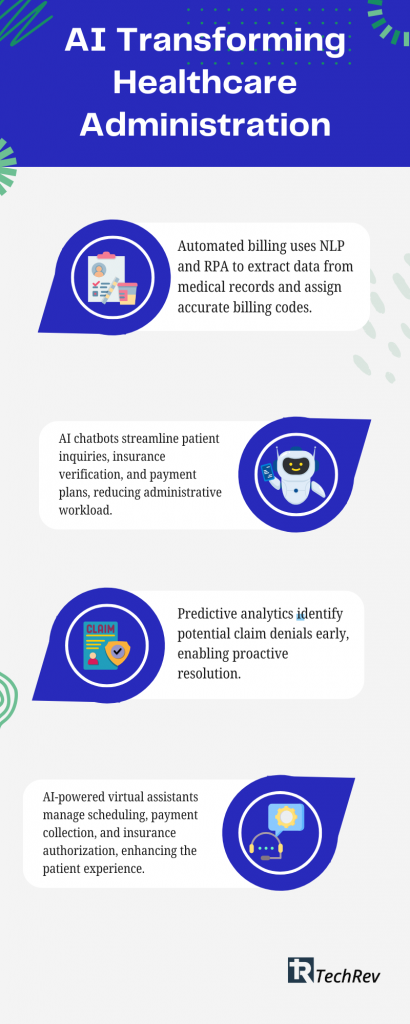AI in healthcare has improved workflow, especially in the revenue management system. It is ensuring that the providers get the right reimbursement for their care services. The revenue management encompasses a complete financial process that begins with patient onboarding. As the registration of a patient in the healthcare system is followed by care appointments for their health condition, timely appointment for follow-up and billing for provided service, insurance, or medical claims become crucial. Therefore, when reaching out to a company for healthcare application development services, it is important to request the integration of an AI-powered billing system into the workflow
For healthcare providers, there are some challenges that arise. These include complexities involved in the payer policies, regulatory requirements, and claim denials. Therefore, the implementation of AI is important to revolutionize revenue management for healthcare. It will help in enhancing efficiency, accuracy, and yearly performances.
Challenges in Revenue Management
The technological advancement has taken place, but there are a few challenges mentioned below that healthcare organizations are struggling with.
- Claim Denial Rates: The study has shown that the denial rate for the claims has increased since the year 2010, which is affecting the flow of cash.
- Administrative Inefficiencies: The chances of error increase during the manual billing process. The leakage in revenue can cost billions in losses annually.
- Code and Documentation Errors: The error in coding is inevitable if not taken care of properly. Also, the AMA states that any error in coding can increase revenue loss and also put compliance at risk.
- Financial Responsibility of Patients: There are now high deductibles in the insurance plans patients take. Therefore, collection is becoming a challenge.
- Interoperability: There are some revenue management systems which cannot get integrated with the electronic health record, and it causes inefficiencies.
With the help of AI-driven revenue management, all the above challenges are addressed and fixed by automating the billing process, improving the data accuracy, and enhancing workflows.
Role of AI in Healthcare Revenue Cycle Management
There is no doubt that the integration of AI in a solution would not only reduce manual tasks involved in billing but also take away the coding workload. The staff can put their focus on complex tasks which include personalized patient care. And the complex work of claim categorization, verifying or identifying missing documents or any error to eliminate for submission can be taken care of by the ML algorithm.

Enhancing Data Accuracy and Integrity
The study of the Kaiser Family Foundation says that there is approximately 80% of claim denials. Therefore, it is important to do the cross-verification to make sure that there is consistency in the patient record. And it can be done with the AI solution. The AI in the healthcare finance management model can take care of the following:
- Detect fraud while analyzing billing patterns. It prevents violations of compliance.
- Check documents for assisting with the notes and coding requirements to eliminate the code error for the provided service.
- Verify eligibility to ensure coordination with the payer and avoid denials due to insurance issues.
- Predict and manage the revenue for the organization to manage the annual cycle efficiently.
Benefits of AI Implementation
Operational Efficiency
Integration of AI in healthcare operations reduces delays and processes claims faster. Additionally, it takes down the staff’s workflow, allowing them to take up the tasks that demand effort. The healthcare automation solutions make cash flow management manageable and transparent for both providers and patients. The quick exchange of data with integrated AI makes communication better and administered, eliminating miscommunication. Lastly, AI helps in the streamlining of reimbursement.
Reducing Error and Fraud
With AI, the detection of duplicate claims is easy. The tools can identify patterns and recognize anomalies. Artificial intelligence can easily flag any suspicious activity that is detected. It will help to keep the process compliant with payer policies.
How Would AI Integration Be Successful?
There is no doubt that AI integration is beneficial for eliminating risk and improving efficiency. But to take complete advantage and ensure successful implementation, the following is required. Also make sure to convey to the IT team withc whom who would be connecting for healthcare application development solution:
- Training for staff to utilize the tool correctly.
- Integration with EHR and billing system to avoid data silos.
- Regular monitoring and adjustment to ensure the AI model works accurately.
- Make sure that all teams from stakeholders to financial and clinical staff work on the AI revenue strategy.

As AI continues to reshape healthcare finance, it’s evident that revenue management can become seamless, accurate, and efficient with the right solutions. With expertise in developing intelligent systems, TechRev can provide customized healthcare application development to integrate medical billing AI software that addresses industry challenges and transforms revenue cycle management for healthcare providers.
Contact TechRev today to explore how our AI billing solutions can revolutionize your healthcare revenue.
